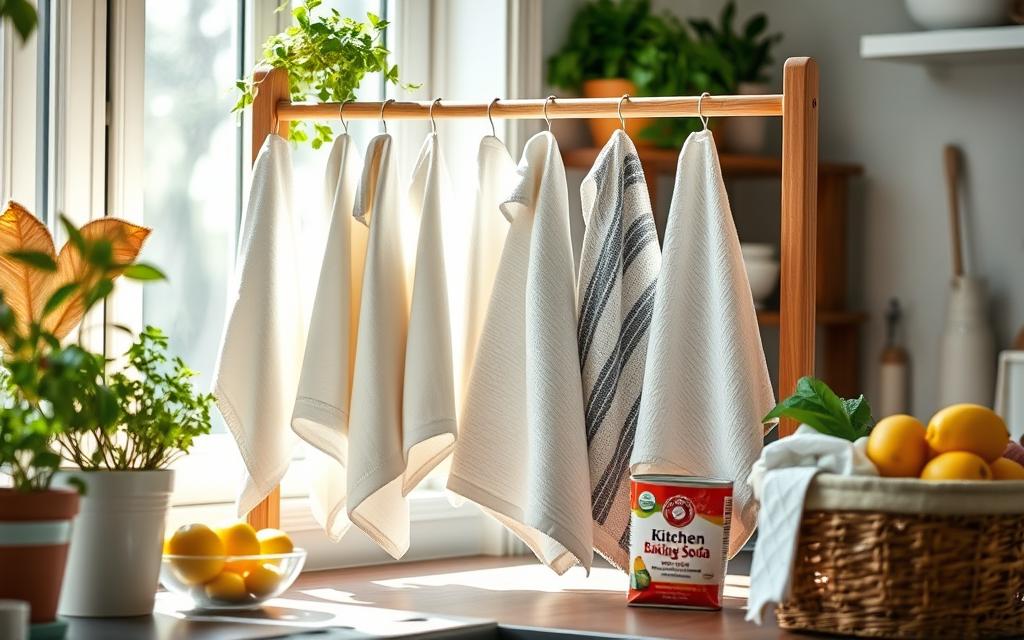Kitchen towels are essential for cleaning and drying, but they can develop unpleasant odors if not cared for properly. Musty or sour smells are common issues, yet knowing how to keep kitchen towels from smelling fresh can make a big difference. In this guide, we’ll explore effective tips to eliminate bad odors and ensure your kitchen towels stay clean and odor-free.

Key Takeaways
- Proper air-drying of kitchen towels before storing helps prevent the growth of bacteria and odors.
- Rotating towels daily and washing them at least once a week with enzyme-based detergents can effectively combat odor-causing bacteria.
- Deodorizing with natural solutions like baking soda or vinegar is more effective than relying on scent boosters.
- Regular cleaning of the washing machine and replacing worn-out towels are crucial for maintaining freshness.
- Avoiding the overuse of detergent and fabric softeners can help prevent the buildup of residues that contribute to unpleasant smells.
Understand Why Kitchen Towels Smell
Kitchen towels often smell bad, which can be annoying. The main reasons are moisture and bacteria. Knowing why towels smell is key to fixing the problem.
Common Causes of Odors
Wet towels are a big reason for bad smells. If towels don’t dry fully, they attract bacteria. This mix of food, grease, and moisture leads to musty smells.
Too much detergent or fabric softener also causes problems. It leaves residue that traps smells. Not washing towels often enough lets bacteria and odors build up.
The Role of Moisture and Bacteria
- Dish rags have lots of protein from food, grease, and water, perfect for bacteria.
- Changing dishcloths often stops mold and bad bacteria growth.
- Boiling dish rags with vinegar for 15 minutes kills bacteria and mold.
Moisture is crucial for bacteria growth on towels. Damp towels are a breeding ground for bad smells. Drying and storing towels right keeps them fresh.
Knowing why towels smell helps you keep them fresh. Good washing, drying, and storage methods are important. They help your towels stay clean and last longer.
Proper Storage of Kitchen Towels
Keeping your kitchen towels clean and smelling fresh is key for a clean cooking space. The right storage is vital to avoid musty smells and keep towels smelling good. By picking the best spot and folding them right, your towels will stay fresh.
Choosing the Right Location
For storing towels, pick a spot with good air flow. Don’t put them in dark, damp places like drawers or closed cabinets. These spots can hold moisture and cause bacteria to grow, leading to bad smells. Instead, hang towels to dry fully before storing them in a cool, dry spot with lots of air.
Folding and Organizing for Airflow
- Fold towels loosely to let air move around them. Don’t fold them too tight, as this can block air and keep moisture in.
- Use a countertop drying rack or hang towels over the oven handle to dry them before storing.
- Switch out your towels often to use them evenly and stop any from getting too wet and smelly.
- Keep 8-10 towels on hand to rotate daily and avoid smells from building up.
By using these easy storage tips, you can keep your kitchen towels clean and smelling fresh. Storing them right is a big part of keeping your kitchen towels in great shape.
| Product | Price |
|---|---|
| Jitejoe Home Kitchen Countertop Dishcloth Drying Rack | $13 |
| Zeppoli Classic Kitchen Towels 15-Pack | $30 |
| HAPPY SiNKS Magnetic Cloth Holders | $110 |
Washing Techniques That Combat Odors
To keep your kitchen towels fresh, you need the right washing methods. Choose a detergent that fights tough odors, like enzyme-based formulas. Don’t use more than two tablespoons of detergent per load. Too much can leave residue that smells.
For a deep clean, use hot water and a longer wash cycle. Wash your towels alone to avoid mixing smells. For extra freshness, add a cup of white vinegar or baking soda. These natural helpers get rid of strong smells.
Selecting the Right Detergent
Go for an enzyme-based detergent to break down and remove odors. Don’t overdo it with detergent, as too much can cause residue and smells.
Optimal Washing Settings
- Wash kitchen towels separately from other laundry
- Use hot water and a longer wash cycle for deep cleaning
- Add a cup of white vinegar or baking soda to the wash for extra deodorizing power
- Consider using a specialized laundry sanitizer for particular odors
By using these laundry hacks for towels and towel cleaning tips, your kitchen towels will stay fresh and smell good.
The Importance of Drying Thoroughly
Drying your kitchen towels right is key to keeping them fresh. It stops bacteria and mildew from growing. You can air dry or use a machine, but make sure they dry well.
Air Drying vs. Machine Drying
Air drying is best for towels because it uses no heat. It keeps the fabric soft and stops dampness. If you machine dry, use high heat and tumble for 30-45 minutes.
Ideal Drying Times for Towels
- Air Drying: Let towels air dry for at least 24 hours in a well-ventilated spot.
- Machine Drying: Dry on high heat for 30-45 minutes to dry them well.
Don’t leave towels damp in the washer or dryer. It can cause bad smells and mold. Proper drying keeps towels smelling good and looking clean.
“Proper care, including washing and gentle drying, can extend the lifespan of tea towels.”
| Drying Method | Recommended Drying Time |
|---|---|
| Air Drying | At least 24 hours |
| Machine Drying | 30-45 minutes on high heat |
Natural Remedies to Freshen Towels
Keeping your kitchen towels smelling fresh can be tough. But, there are natural ways to get rid of odors. White vinegar is a strong natural deodorizer. Just add 1 cup of white vinegar to the rinse cycle or soak towels in it for 30 minutes before washing.
Baking soda is another great odor-eliminator. Add 1 cup of baking soda to the wash cycle. Or, make a paste with baking soda and water to treat stains and smells. For really tough odors, mix 1/2 cup of baking soda with 1-1/2 cups of white vinegar in hot water. Soak the towels for 2 hours, then wash them as usual.
- Use white vinegar in the rinse cycle or soak towels in a vinegar solution for 30 minutes before washing.
- Add 1 cup of baking soda to the wash cycle or create a paste to spot-treat stains and odors.
- For tough odors, soak towels in a mix of 1/2 cup baking soda and 1-1/2 cups white vinegar for 2 hours, then wash.
These natural methods can get rid of odors from kitchen towels. They keep towels smelling fresh without harsh chemicals or fabric softeners. By adding these steps to your towel-care routine, you can eliminate odors from kitchen towels and remove towel odors.
Avoiding Fabric Softener Mishaps
Fabric softeners might seem like a quick fix for soft towels. But, they can cause lingering odors and less absorbency. The leftover residue from fabric softeners can hold moisture and bacteria, making towels smell musty and hard to clean.
Why Fabric Softeners Can Contribute to Odors
Fabric softeners coat towel fibers with chemicals. This coating can stop towels from drying properly. It traps moisture and bacteria, causing odors that are tough to get rid of, even with frequent washing.
Alternatives to Fabric Softeners
- Use white vinegar in the rinse cycle instead of fabric softener. Vinegar is a natural fabric softener that won’t leave behind residue.
- Try using dryer balls, which help soften towels and increase airflow during the drying process.
- If you must use a commercial fabric softener, choose one designed for towels and use it sparingly. Avoid using it on your kitchen towels.
By skipping fabric softeners and choosing natural options, you can keep your kitchen towels fresh and absorbent. This is one of many laundry hacks for towels that can help keep your home’s towels clean.
| Fabric Softener Alternatives | Benefits |
|---|---|
| White Vinegar | Natural fabric softener, no residue |
| Dryer Balls | Softens towels, increases airflow |
| Softener for Towels | Specially formulated, use sparingly |
“Cutting down on laundry detergent can save clothes. More detergent can trap odors and make fibers crunchy.”
Frequency of Washing Kitchen Towels
Keeping your kitchen towels fresh and clean is key to avoiding musty smells. The washing frequency depends on the towel type and how often you use them.
How Often Should You Wash Them?
Wash your kitchen towels at least once a week. If they get a lot of use, wash them more often. Cotton towels, being very absorbent, should be washed every day or after each use. This keeps them fresh.
Microfiber towels, also very absorbent, can be washed often without losing their cleaning power. But, avoid using fabric softeners. Linen towels, quick to dry, can be washed once a week or every two weeks.
Signs It’s Time to Wash Your Towels
- Visible stains or discoloration
- Dampness or a noticeable musty odor
- Frequent use for a variety of tasks, such as drying hands, wiping down surfaces, and cleaning up spills
In busy homes, having 8-10 kitchen towels is a good idea. This way, you always have a fresh towel ready. Also, clean your washing machine often to stop odors from spreading to your towels.
By washing your towels regularly and watching for signs they need washing, you can keep your kitchen smelling fresh. This makes your kitchen a cleaner, healthier place.
When to Replace Your Kitchen Towels
Keeping your kitchen towels fresh and clean is key for a clean kitchen. Even with regular cleaning, towels can wear out. Knowing when to replace them is crucial to keep your kitchen smelling fresh.
Identifying Worn or Stinky Towels
Check for these signs that your towels need to be replaced:
- Fraying edges or thin spots indicating excessive wear
- Persistent odors that don’t dissipate after washing
- Discoloration or stains that won’t come out
If you see these signs, it’s time for new towels to keep your kitchen smelling good.
Choosing Quality Towels for Longevity
Choose towels made from high-quality materials like 100% cotton or microfiber. Look for towels with strong edges for longer life. Antimicrobial towels are also a good choice as they fight off bacteria and odors.
By choosing the right towels and replacing them when needed, you can keep your kitchen towels fresh and clean. This ensures a clean and healthy cooking space for years.
Tips for Maintaining Freshness
To keep your kitchen towels smelling fresh, it’s key to have a routine. Start by switching towels every day. This stops odors and bacteria from building up.
Regularly Rotate Towels
Use different towels for drying hands, dishes, and cleaning. Don’t mix them. Hang or dry towels in a place with good air flow, like a rack or oven handles.
Keep Towels in a Well-Ventilated Area
Also, use a laundry hamper with holes to store dirty towels. This keeps moisture and smells away. Clean your towels and washing machine often. This keeps them smelling good and prevents bad smells from forming.




Leave a Reply